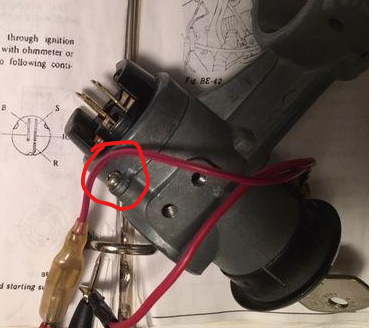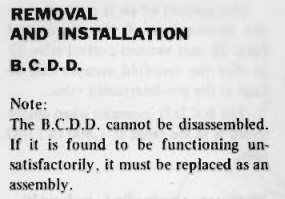Everything posted by Zed Head
-
What is this hole??
Isn't that hole threaded? If I recall correctly that hole is for areas that still used carbs like Europe and Australia. It's a carb mount hole I think. Odd that yours leaks. You might have a cracked head or somebody drilled through the bottom of the hole for some reason. If you're sure the head isn't cracked you could just run a threaded allen-head plug in to it with some sealer. Try to see down the hole to where the coolant is getting in. If it's from the bottom probably not a big deal. If it's from the side then probably a problem. Short answer is it shouldn't be leaking from that hole.
-
1971 HLS30-14938 "Lily" build
-
What is this hole??
There are a lot of holes in your picture. Pick one.
-
What engine do I have?
That's not a bad idea. Consider just buying an unmolested secondhand motor though, if you want to avoid a PO's mistakes. These engines can go high miles before needing any work. There are still many engines out there that haven't been opened since they were sealed at the Nissan factory. You could buy a whole car and probably come out ahead of fixing a PO's mistakes.
-
Trouble-shoot directions for ignition/no start
I repaired one once. It depends on what's wrong with it. The two red wires are for the steering lock switch. You want to test between the pins on the end of the switch, using the chart with B, S, IG, and A. The circles with a line between them indicate when there should be continuity. You can also plug it back in turn the electrical part alone. I had a switch that would not turn the electrical part far enough. I had to twist the rod between the mechanical and electrical parts. Take the two screws out and use a screwdriver to turn the electrical switch. You'll see the little flat rod that turns it when you take it apart. You might have to destroy one of the screws, Nissan made them one time use as an anti-theft measure.
-
280Z Requires Starting Fluid for Cold Starts
We're in the very common troubleshooting loop of "I already did that". You're about at the point where you just have to understand how the system works. The first few pages of the engine fuel chapter tell you what is supposed to happen. The injectors open when the power is grounded, they stay open for a length of time that is determined by things like temperature and how far open the AFM vane is, etc. Once you start thinking that way you'll have new ideas. Seems like you've done a bunch already that you haven't described, and haven't done some of the things that have been suggested, like confirming power to the injectors during starting. Good luck.
-
280Z Requires Starting Fluid for Cold Starts
- Trouble-shoot directions for ignition/no start
-
280Z Requires Starting Fluid for Cold Starts
It's supposed to be attached to the firewall near the battery. It looks like the one that goes to the positive terminal. They sit close to each other and sometimes get switched by accident. You don't show the ground test in your list. Testing grounds is probably the most commonly overlooked test for automotive electrical problems.
-
280Z Requires Starting Fluid for Cold Starts
One more possibility - bad or disconnected ground on EFI circuit. It's been known to happen. It's the wire at the negative terminal of the battery with the plastic connector. Confirm power to the injectors. While starting.
- Trouble-shoot directions for ignition/no start
-
280Z Requires Starting Fluid for Cold Starts
Grit, I'm not really suggesting things that you should do on a whim, I'm suggesting things that I would do if I had your problem. I'd use a mirror to see the AFM.
-
280Z Requires Starting Fluid for Cold Starts
Another guess and one that happened to me except that it happened when things got hot. The EFI relay coil would get an open circuit and not actuate the relay during starting. Just crank, crank, no start. You could jump the EFI relay pins as a test. One more - you say that you're not getting the injector test lights flashing during starting. This could also be caused by loss of injector power. Put a meter on an injector plug and see if you lose power during starting. The best way to solve these EFI problems is with a detailed list of tests and knocking them off one by one.
-
280Z Requires Starting Fluid for Cold Starts
I still think that this is worth doing. If the vane is stuck you'll get less fuel. It's not uncommon, I think that confirming the vane isn't stuck is one of the checks in the FSM. As far as the starting fluid non-start is concerned, where are you squirting the fluid? You should squirt it in to the manifold after the throttle blade for best effect.
-
OFFICIAL 280Z "Fuel Damper" thread!
I've not heard of them clogging. I think it's just a diaphragm that flexes with pressure pulses. The easy check is to remove it and see if it flows. You'll probably want to replace the hoses anyway, they're old and on the high pressure side.
-
OFFICIAL 280Z "Fuel Damper" thread!
I referred to a bunch of them. Not sure which you're talking about, but most will require some finessing to get in. Even Nissan built a custom bent line to mount their stuff. Study those fuel lines and you won't feel bad about adding a few more bends. They're just well-done backyard mechanic bends.
-
280Z Requires Starting Fluid for Cold Starts
Another guess. I went back to the first post but can't be sure. How old is the fuel in the tank? Old fuel will often lost volatility. Sometimes it will last for years, sometimes it goes bad in months.
-
280Z Requires Starting Fluid for Cold Starts
Take the black cover off of the side of the AFM. It is just a press fit with some light sealant to hold it in place. There is a damper weight that moves with the AFM vane. If you move the weight the vane will move, and vice-versa. It should start moving as soon as the engine turns over.
-
280Z Requires Starting Fluid for Cold Starts
I have a new thought. Maybe the AFM blade is sticking shut during the low air flow of starting. That would lower the injector open time, delivering less fuel. Maybe pop the cover off the AFM and watch it, or prop it open. Also possible that you have a vacuum leak that also allows air to bypass the AFM.
-
280Z Requires Starting Fluid for Cold Starts
It's a good question and maybe Nissan had a plan for that. Easier to just measure what's actually happening though. As I mentioned above my engine started with no CSV at all. If the injectors weren't squirting there'd be no gas to start with. And there are no pins to the CSV or thermotime switch to the ECU. So, no way for the ECU to "know" if it's squirting. I think that the CSV is extra, added on top of injector fuel.
-
Fuel Pump Issues... AGAIN
The relay numbers are pressed in to the fiber board bottom of the relay. Very difficult to see, but they are there. Sometimes the stamping is not too sharp. Bright light and good eyesight help.
-
280Z Requires Starting Fluid for Cold Starts
If you're absolutely positive that the injectors aren't opening then that should be your focus. Check the Pin 1 circuit at the ECU. Maybe it has too much resistance or something weird happens during starting. Pin 1 is connected to the negative terminal of the coil so the ECU can "see" when the coil fires. On the module don't assume that new is good. 1978 does have "HEI" but the module I was talking about is the GM HEI module swap.
-
280Z Requires Starting Fluid for Cold Starts
I had a problem once with a weak, not completely bad, ignition module. The spark was too weak during starting to fire gasoline, but would fire on starting fluid. Once it started it seemed to run okay, Probably low voltage during starting through a weakened ignition module. The module has to have good current through it to create good spark. I damaged the module by leaving some spark plug wires disconnected and starting the engine. Forgot to say that I did change the module to a new HEI module once I figured out that it was weak spark. Orange, not blue. The new module fixed it. So, if you're still baffled, trying the HEI module swap might be worth a shot. Pretty cheap and you can wire it up under the hood using spare wire pretty easily, as a quick test. These old modules die on a regular basis anyway, yours will eventually. Might as well be ready.
-
Intake manifold noise
-
280Z Requires Starting Fluid for Cold Starts
I'm just reading the words in the FSM.









